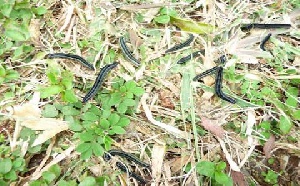The news that the fall armyworms continue to ravage farms across the country is indeed very worrying. Many thought the issue had been dealt with by the Ministry of Food and Agriculture (MoFA), more especially when the sector Minister, Dr. Osei Akoto, declared somewhere in July this year that the armyworm invasion had completely been defeated.
However, from the look of things and reports on the ground, the armyworms are still with us and doing more damage as usual to the farms of our hard working farmers. Already the invasion of the armyworms in Ashanti, Brong Ahafo, Volta, Eastern and the Northern Regions early this year has seen the destruction of over 15,000 hectares of farmlands.
That is a huge investment gone waste. The latest person to wade into this matter is former Presidential Staffer under the Mahama administration, Dr. Clement Apaak. According to Dr. Apaak, the agric minister’s declaration was unfathomable presenting the country with an existential threat that can do more damage to lots of farms.
“As we speak now, the problem continues to exist and the sooner we admit that it is with us so that we can start looking at whatever remedial actions that can be taken, the better for us as a nation,” Dr. Apaak noted on Starr FM in Accra yesterday.
In fact, on the same FM station, the General Secretary of Ghana Agricultural Workers Union (GAWU), Edward Kaware, affirmed that the fall armyworms were still with us.
If what the above personalities are saying is true then the agric ministry needs to tackle the problem head on. We do not know why the country was earlier told that the fall armyworms have been dealt with when in actual fact they were causing havoc on farmlands.
Theh armyworm issue is serious and must be dealt with as such. It is in the light of these new reports that we are urging MoFA to find a lasting way of addressing the problem. The long talk will certainly not solve the problem.
We need more pragmatic measures to fight these menacing armyworms before they eat all our food crops.
Opinions of Thursday, 14 September 2017
Columnist: todaygh.com















